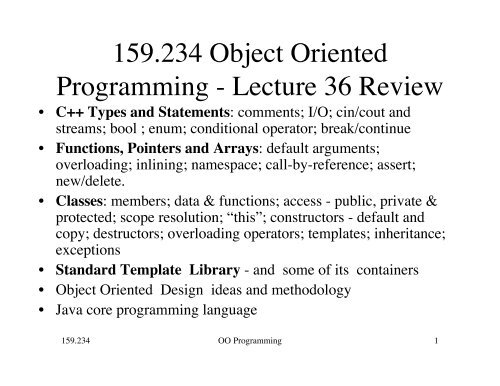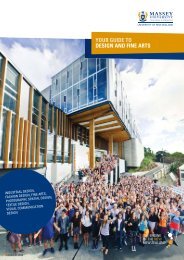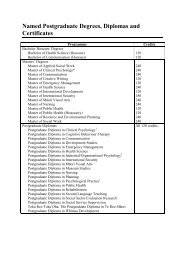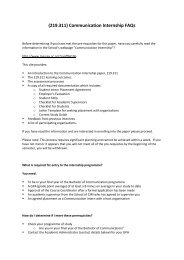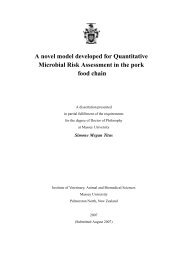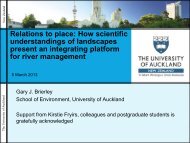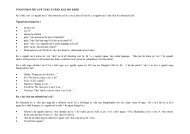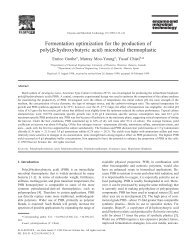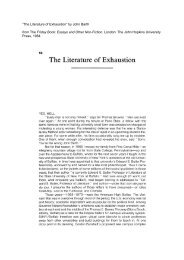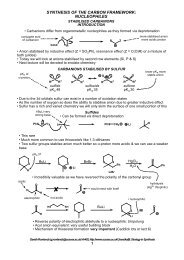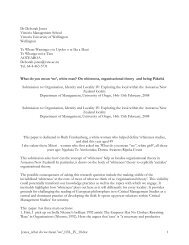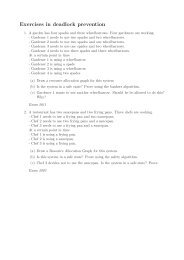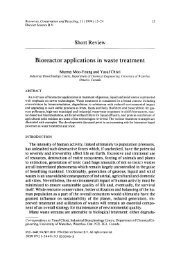159.234 Object Oriented Programming - Lecture 36 Review
159.234 Object Oriented Programming - Lecture 36 Review
159.234 Object Oriented Programming - Lecture 36 Review
Create successful ePaper yourself
Turn your PDF publications into a flip-book with our unique Google optimized e-Paper software.
<strong>159.234</strong> <strong>Object</strong> <strong>Oriented</strong><br />
<strong>Programming</strong> - <strong>Lecture</strong> <strong>36</strong> <strong>Review</strong><br />
• C++ Types and Statements: comments; I/O; cin/cout and<br />
streams; bool ; enum; conditional operator; break/continue<br />
• Functions, Pointers and Arrays: default arguments;<br />
overloading; inlining; namespace; call-by-reference; assert;<br />
new/delete.<br />
• Classes: members; data & functions; access - public, private &<br />
protected; scope resolution; “this”; constructors - default and<br />
copy; destructors; overloading operators; templates; inheritance;<br />
exceptions<br />
• Standard Template Library - and some of its containers<br />
• <strong>Object</strong> <strong>Oriented</strong> Design ideas and methodology<br />
• Java core programming language<br />
<strong>159.234</strong> OO <strong>Programming</strong> 1
<strong>Object</strong> <strong>Oriented</strong> <strong>Programming</strong><br />
• What makes an OO <strong>Programming</strong> language?<br />
– Mechanisms to allow and support abstract data types<br />
– Inheritance capabilities to form relationships between classes<br />
– <strong>Object</strong> concepts<br />
• <strong>Object</strong>-<strong>Oriented</strong> vs <strong>Object</strong>-based languages<br />
• Historically:<br />
– OOP started with SIMULA-67 around 1970<br />
– Other OO Languages include: C++; Java; Smalltalk; Ada;<br />
<strong>Object</strong> Pascal; <strong>Object</strong>ive C; DRAGOON; BETA; Emerald;<br />
Pool; Eiffel; Self; Oblog; ESP; Loops; Polka; Python.<br />
– Growing list- C#; Perl5 and VB allow some OO support.<br />
<strong>159.234</strong> OO <strong>Programming</strong> 2
<strong>159.234</strong> OO <strong>Programming</strong> 3<br />
typedef<br />
return<br />
if<br />
delete<br />
try<br />
reinterpret_cast<br />
goto<br />
default<br />
true<br />
register<br />
friend<br />
continue<br />
while<br />
throw<br />
public<br />
for<br />
const_cast<br />
wchar_t<br />
this<br />
protected<br />
float<br />
const<br />
volatile<br />
template<br />
private<br />
false<br />
class<br />
void<br />
switch<br />
operator<br />
extern<br />
char<br />
virtual<br />
struct<br />
new<br />
explicit<br />
catch<br />
using<br />
static_cast<br />
namespace<br />
enum<br />
case<br />
unsigned<br />
static<br />
mutable<br />
else<br />
break<br />
union<br />
sizeof<br />
long<br />
dynamic_cast<br />
bool<br />
typename<br />
signed<br />
int<br />
double<br />
auto<br />
typeid<br />
short<br />
inline<br />
do<br />
asm<br />
C++ keywords
Five Reasons for using OOP<br />
1. OOP lets you create new data types, which work like<br />
built-in types. A variable of the new data type is like a<br />
small program - it has an internal state, and external<br />
operations.<br />
2. <strong>Object</strong>s encapsulate code together with data. This<br />
programming model produces cleaner, more readable<br />
and more maintainable programs.<br />
3. Names (identifiers) are hidden inside new data types -<br />
this prevents “global namespace pollution”<br />
4. Data protection prevents accidental changes.<br />
5. Polymorphism supports the creation of extensible<br />
programs.<br />
<strong>159.234</strong> OO <strong>Programming</strong> 4
Textbook <strong>Review</strong><br />
• C++ <strong>Programming</strong><br />
– Pohl - Addison Wesley<br />
– Schildt - McGraw Hill<br />
– Deitel & Deitel - Prentice Hall<br />
• STL<br />
– Schildt<br />
– See also Web<br />
• OO Design<br />
– Using UML - Addison Wesley<br />
– UML and C++ - Prentice Hall<br />
• Java <strong>Programming</strong><br />
– Java in a Nutshell, & Java in a Nutshell Examples, Pub. O Reilly<br />
<strong>159.234</strong> OO <strong>Programming</strong> 5
C++ <strong>Programming</strong> Books<br />
• C++ for C Programmers, Ira Pohl, 3rd Edition,<br />
Pub Addison-Wesley, 1999.<br />
• Does lead on well from C<br />
• Quite up-to-date and does cover STL basics<br />
• Has good index, and good descriptive examples<br />
• Online code examples available<br />
Recommended textbook for <strong>159.234</strong><br />
<strong>159.234</strong> OO <strong>Programming</strong> 6
• The Annotated C++ Reference manual -<br />
ANSI base Document, Margaratet A. Ellis<br />
and Bjarne Stoustrup, Pub Addison-Wesley,<br />
1990<br />
• Definitive<br />
• In the Massey Albany library<br />
• Not easy to learn from<br />
• Online definitions available<br />
• Covers language core only - not the STL<br />
<strong>159.234</strong> OO <strong>Programming</strong> 7
• The Complete Reference C++, Fourth<br />
Edition, Herbert Schildt, Pub McGraw Hill,<br />
2003<br />
• Good coverage of Language and STL<br />
usage and advanced features<br />
• Very good index and appendices<br />
• Excellent reference but not so easy to learn<br />
from<br />
• Online code examples accompanies book<br />
<strong>159.234</strong> OO <strong>Programming</strong> 8
<strong>159.234</strong> Exam<br />
• 9th June 2004 - afternoon<br />
• Grading - 70% exam; 30 % Assignments<br />
– Assignment 1 - File and Streams I/O (6%)<br />
– Assignment 2 - Regression Fitting (6%)<br />
– Assignment 3 - Vector template container (6%)<br />
– Assignment 4 - Movies Database example (12%)<br />
<strong>159.234</strong> OO <strong>Programming</strong> 9
Exam Coverage<br />
• All C++ Ideas and Syntax covered in the lectures,<br />
tutorials and assignments.<br />
• Questions might ask you:<br />
– to say what a code fragment does;<br />
– or write a short code fragment;<br />
– or say why a given code fragment does not work.<br />
• No Java and no Builder in the exam.<br />
<strong>159.234</strong> OO <strong>Programming</strong> 10
Exam Preparation<br />
• Generally: organise your notes, handouts and<br />
assignments. Read though all your material -<br />
what did you find difficult?<br />
• Test yourself on the material - review the<br />
example codes and try to understand them and<br />
write short codes of your own to test your ideas.<br />
• Try to finish your studying the day before the<br />
exam…<br />
<strong>159.234</strong> OO <strong>Programming</strong> 11
At the Exam…<br />
• Do not panic.<br />
• Read the exam questions well before you try<br />
to answer each part. Note the marks for each<br />
part.<br />
• Make sure you answer as much as you can but<br />
make sure you do get credit for the material<br />
you know well.<br />
• There will be six questions and you should<br />
answer them all.<br />
<strong>159.234</strong> OO <strong>Programming</strong> 12
Where Next?<br />
• Hopefully C++ will be useful to you in your careers<br />
as Computer Scientists/ Engineers/ Programmers…<br />
• It is a living language and will develop - see the<br />
Web, and conferences like OOPSLA.<br />
• It will be directly useful to you in 3rd year<br />
papers…to help implement and test ideas<br />
• You may find other OO languages like Java useful<br />
too.<br />
• There is a still a lot to learn about OO Design and<br />
you will benefit a lot from experience. Ideas like<br />
“Design Patterns” may help you.<br />
<strong>159.234</strong> OO <strong>Programming</strong> 13
All the best for your future<br />
and enjoy programming :-)<br />
<strong>159.234</strong> OO <strong>Programming</strong> 14


